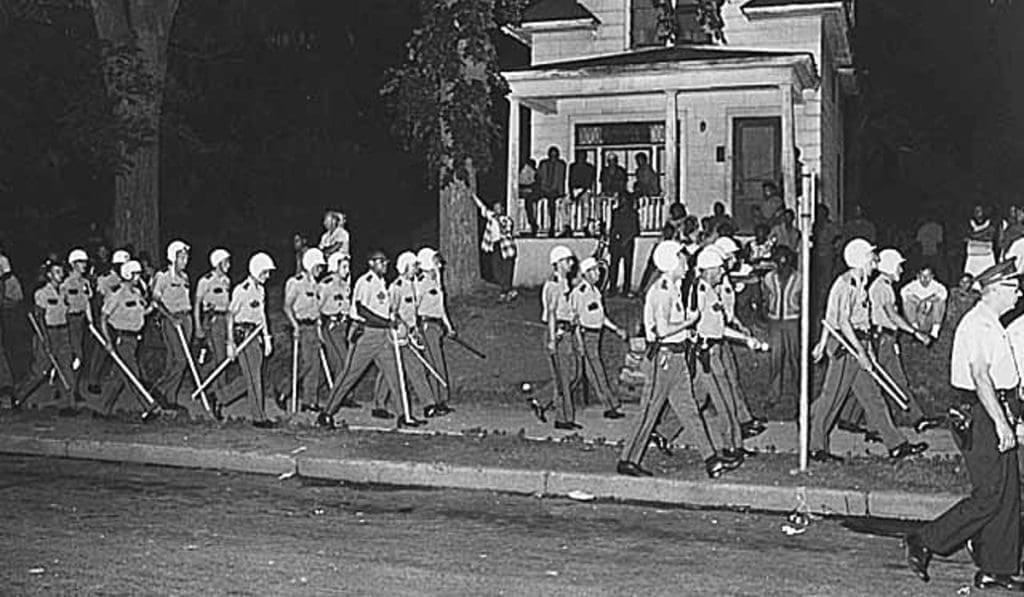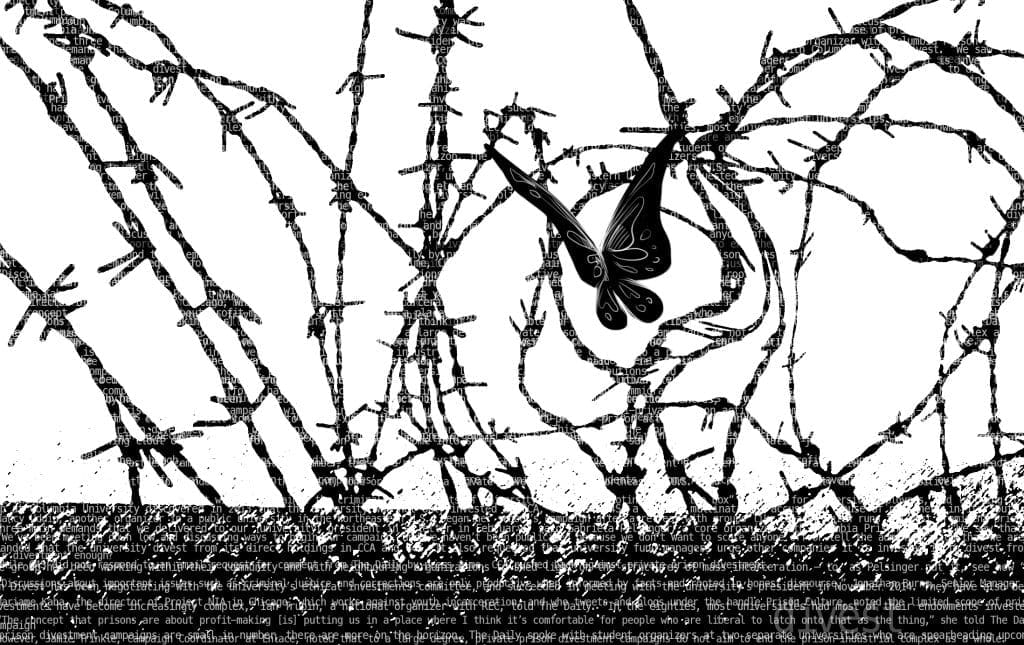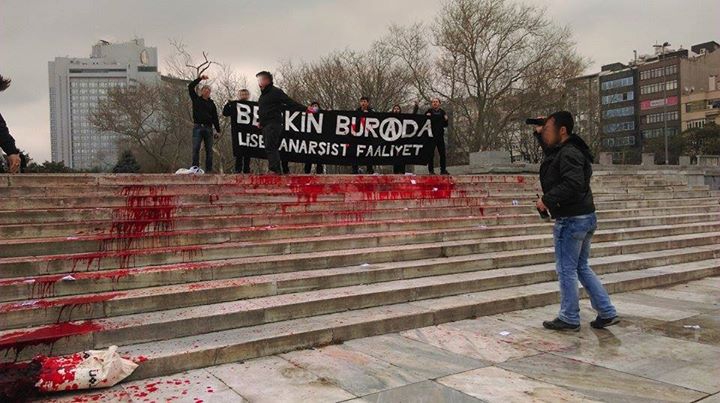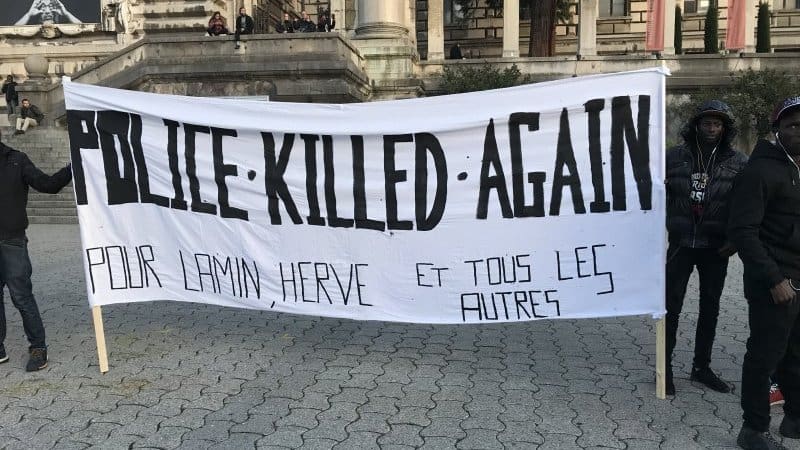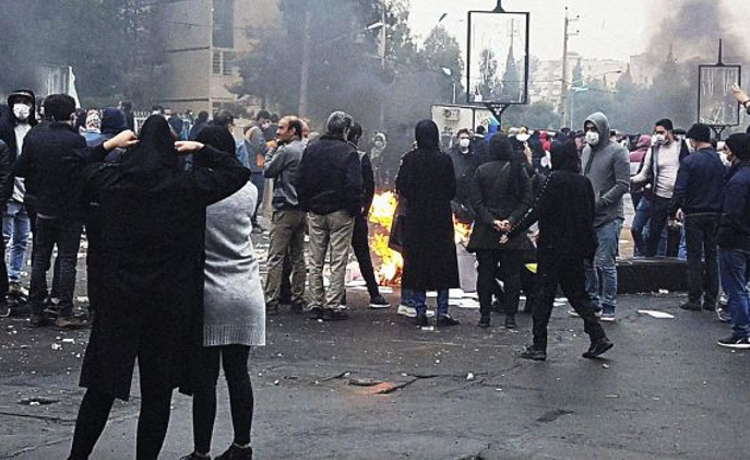Transcribed from the 4 June 2020 episode of This is Hell! Radio (Chicago) and printed with permission. Edited for space and readability. Listen to the whole interview:
Black people’s introduction to this country was robbery. We are stolen people. Our labor is stolen. Our lives are still being stolen by the police and they always have been.
Chuck Mertz: The language surrounding protests against police violence seems almost intentionally scripted to delegitimize the public’s demand for an end to racist violence conducted by police with impunity. Here to help us decipher what is said about the protests and why, returning to This is Hell!, we are very happy to have back on the show writer William C. Anderson, who posted the Truthout article “Forget ‘Looting.’ Capitalism is the Real Robbery” as well as the ROAR Magazine article “We defend ourselves so we can all breathe in peace.”
William has appeared on This is Hell! twice in the past, back in June 2018 as well as in April 2017, to discuss works he co-authored with another past guest on the show, Zoé Samudzi: the book As Black as Resistance: Finding the Conditions for Liberation and the ROAR article “The Anarchism of Blackness.”
Welcome back to This is Hell!, William.
WA: Hey, how are you doing?
CM: Good. It’s great to have you back on the show.
After president Trump said, “When the looting starts, the shooting starts,” you wrote, “The president of the United States threatened state-sanctioned murder in response to looting, laying bare the way in which white supremacy, capitalism, and the state work together to violently repress people who defend Black life.”
Are those who president Trump, and many in the media, see as looters—are they protecting Black life? And if so, how? What do president Trump’s supporters miss, what does the media miss, when they don’t see this as an act of protecting Black people?
WA: People get sucked into focusing on looting and small businesses being hurt for the same reason people get sucked into narratives like so-called “Black-on-Black crime.” The message is essentially that the reaction of people to oppression is just as bad or worse than the conditions that caused it. It’s basically a form of victim-blaming. People find it much easier to confront the person on the street reacting at a protest than they do the systemic problems that are in front of us. If the police were not killing Black people we wouldn’t have these so-called looters in the first place.
I want to challenge people’s use of that word, too, as well as the word “riot,” because these are really racialized words that have a lot of Black death and stigma and oppression attached to them. Black people’s introduction to and our beginnings in this country was robbery. We are stolen people. Our labor is stolen. Our lives are still being stolen by the police and they always have been. And we’re being robbed of every resource that’s supposed to be a guaranteed right as citizens in this country—which we’re not truly considered.
We’ve had to fight and die just to get what we have now, which is not enough, and we’re descended from people for whom it was illegal to read and write. Here we are now, still having to fight for education, healthcare, housing, and the limited labor protections that we have. In this moment it’s absurd to focus on Black people uprising and taking things, when there are 42 million people currently out of work since this pandemic happened. There is a gargantuan robbery taking place on Wall Street by the wealthy in this country. CEOs who make so much money that it would take several lifetimes to spend won’t even give their employees healthcare. And then someone takes something from a multinational corporation that rakes in billions while exploiting the people who work there, and people sympathize more with the property. That’s absurd.
You hear people say, “This is why the police treat y’all like that,” which reinforces the criminalization and racial profiling and actually makes the point that the police are racist. And you hear people say stuff like, “Stop, this is going to make people think badly about us.” But people have to focus on the real stuff that’s happening—and that’s capitalism. Because capitalism created these conditions to begin with.
Before we got on the call I was reading Malcolm X’s speech at the London School of Economics, and he was talking about the uprising in New York in 1965—and he was talking about this too. He was saying the riots weren’t riots in the first place, they were reactions to police brutality. When store windows were broken in the Black community, it came to appear that this was being done by people who were “hoodlums and vagrants and criminals” when they were actually people reacting to civil rights violations.
People get distracted, and they get steered away from what the focus should be. Folks are reacting to property because they can’t address the issues at hand and the society that has disempowered people. When you go to the voting booth and you’re disenfranchised, and you keep having to vote for somebody in a system where all the politicians are really in cahoots, though you have the illusion of choice, then of course you’re going to react in ways, eventually, that are going to be against the things that are right in front of you. People are going to react that way. It makes sense. But the true issue at hand is: it’s capitalism that is making people have to do that in the first place. If that weren’t in existence we wouldn’t be here, would we?
CM: On the fiftieth anniversary of what took place in Detroit back in 1967, the Detroit Free Press and the Detroit News ran a front page article about how they were no longer going to be referring to it as they had for fifty years, as the “riots” in Detroit, and instead started to refer to it as an uprising. Finally, in both the Detroit Free Press and the Detroit News they have only referred to what had been called riots as an uprising.
What is wrong with the word riot? What does it mislead us into thinking? How does it take away the political agency of the people on the ground who are protesting against police violence?
WA: When we call it a riot, there’s a history. We can think about the term race riot. The massacre that occurred on Black Wall Street in Tulsa is referred to as a race riot in the old newspaper clippings. There are a lot of massacres of Black people, historically, that were called race riots. All of this language is very purposeful, and we have to be careful about how we describe things. Especially if we hear the state and the media using these terms, we have to be extremely careful, because it’s intentional—and it’s used as a way to get people to not sympathize or have empathy, and not share solidarity with the people on the ground who are fighting back against an unjust system.
We don’t want to get caught in this “good-protester-versus-bad-protester” narrative stuff. We don’t want to get involved in reproducing police narratives. If we start doing that, then we risk people starting to sympathize with the police rather than ourselves. The issues that created this problem in the first place, again, is what we need to focus on.
It’s definitely intentional to use these sorts of terms: it is a concerted effort to make Black people seem as if we are the enemy, and that we are bringing whatever is happening to us on ourselves.
There are a lot of ways to protest, and we can’t be certain why someone is stealing or what they’re going to do with what they took afterwards. There are people out here reclaiming goods because they want to distribute them to people in need. There were people doing that because they viewed taking back in that way as a political act of reclaiming. There are people who take things because they feel like it, too. And there are people who take things because they need them.
The concern is the bigger picture here. None of this would be happening if the police weren’t killing people in the first place, and we cannot get distracted from that.
CM: Looting is “robbery during war or riot,” by definition. In the state of California under penal code 463, state laws view looting as “any burglary committed during a state of emergency.” Historically, “looting” and “pillaging” were crimes committed by soldiers against civilians only during war.
In your opinion, what is the point of using a term that by definition, historically and legally, is not accurate and in every instance pertains only to war? Why does the media and the state want the citizenry and voters and viewers to believe we are in a state of war?
WA: One thing I think a lot about it citizenship. As I mentioned just now, Black people in this country are not considered true citizens. All the promises and guarantees of citizenship do not apply to us. It’s definitely intentional to use these sorts of terms, because it is a concerted effort to make Black people seem as if we are the enemy, and that we are bringing whatever is happening to us on ourselves.
In Ferguson, police referred to Black people as “enemy combatants” and used war language against people who were uprising there. This has always happened. Black people are not considered true citizens. When you start getting people to think, “Oh, they deserved that,” or that we brought this on ourselves, or that this is our fault, you start to take away people having solidarity with and understanding for protesters and people who are resisting on the ground. It’s very intentional.
You have to turn people who are protesting into enemies. You have to turn the protest and the uprising and the movement inside out, and create division. You have people who become so concerned with respectability, how the protests look, and how the media portrays them that they start feeling like they have to police the actions that are going on. But there is more than one way to protest, and that has always been the case. We have to start thinking about the actual history here. Rioting and looting as we know them are terms that have always been used against black people historically to accomplish the things that I’ve just talked about, and we have to push back against that.
These are uprisings. These are rebellions. These are revolts that we’re seeing. These are part of a necessary process to transform the conditions in society. People have tolerated as much as they possibly can. When people start to push back after saying “I’m not going to tolerate this anymore,” we need to share solidarity with them, period. We don’t need to be saying, “Why are they taking stuff out of Target? What are they taking stuff out of Best Buy? Why did they break that window?” when there’s a much, much bigger robbery going on in this country: the robbery of Black life. The robbery of people’s healthcare. The robbery of people’s housing. The robbery of people having the resources they need to survive and have a life in this country.
We’re in the middle of a pandemic. It is absurd that people are focusing on looting and talking about looters. There are tens of millions of people out of work. At the end of the day, it’s about the bigger picture. Let’s focus on that.
CM: I personally cannot take watching even one second of what happened to George Floyd. I watched the video once, and I don’t need to see it again. Yet it is being showed every day, every night. The national news last night, CBS, ABC, NBC—they each showed it again.
You write, “Lynchings thrive off spectatorship. For white supremacists, the act of killing is also an act of fellowship, an opportunity for indoctrination. Simply spreading images of racist killings and asking the state to stop killing us is not going to stop them. In fact, while it’s important to publicize the fact that these killings are occurring, sometimes the spread of such images also galvanizes white supremacists.”
How does the witnessing of lynching indoctrinate white supremacists? They keep showing these killings over and over again, and I keep wondering: is it—as the media repeats—important to see the video so we understand the violent cruelty that police are using against Black people? Or is this potentially spreading even more white supremacy?
WA: This is a process we see over and over again. We know that the police are killing us. We know. I don’t need to see a video of the police killing a Black person to know that the police are killing us. I don’t need to see evidence of the police killing a Black person to know that the police are killing us. The police have always killed Black people. That has been their purpose since their birth. Since the birth of the modern police force as we know it, this has happened.
We can sit up here and say, “Where’s the tape? Where’s the footage?” but that narrative about “needing to see what actually happened” plays into the binary of innocence and guilt: is the killing justified or not justified? But do we need to justify the killing in the first place? The extrajudicial killings of Black people, lynchings, and the violence that has taken place against Black people historically is something that has never been justified. It is the legacy of all of this death and brutality that has been waged against Black people in the first place.
We need to be focused on how we can get people to understand that this society is killing us without this whole pornographic relationship with Black death that white supremacists engage in.
I don’t feel like it’s good to get caught up in evidence, when we know that what has happened to Black people in this country has happened regardless of so-called innocence and guilt. These videos are widely circulating, are traumatizing Black people—and also they take away a lot from the person who is being brutalized, who is being killed, who is being abused in the video.
I’ll tell you right now. If anything were ever to happen to me, if I was to be killed by a police officer or whatever the case may be—if I’m experiencing violence from white supremacy in this country and it’s caught on camera, I don’t want it to circulate. I don’t want it to be shared by some viral influencer saying “People need to see this” so they can get retweets. I want people to do something that is an act of rebellion that strikes back at what took my life in the first place. I don’t want people to share a viral video of me and have it circulated and have it end up in white supremacist forums so that they can joke about it and copy and paste it in little goofy videos and memes. I want people to do something in response to that violence that happened to me, if something like that happened to me.
That’s what’s taken away from a lot of the people who fall victim. You don’t know if people want those videos of them being killed circulating like that. I don’t want that. The family of Mike Brown told people to stop circulating pictures of him and his body laying in the street after that happened. You don’t know what people who were victims of police brutality and other forms of white supremacist violence want. People assume, because they feel a sense of ownership over Black people’s bodies and they feel like they can do whatever they want. Because the legacy is that Black people are property, we can do whatever we want with their bodies; we can share and disseminate these images as we want. But that’s absolutely ridiculous. We can’t continue feeling like we have the right to take people’s last moments, these precious, sensitive moments of their lives, and just do with them whatever we please.
It’s not right. It’s just not right. We also have to think about the legacy in this country of Black death in images. There are lynching photos which were circulated as on postcards to celebrate Black death. That still happens. White supremacists are still doing that. There’s way more to this than just sharing something that is going to “help the cause,” because it’s actually really traumatic. It’s not necessarily helpful to try and galvanize people by saying “Look what happened here,” and force people to see it so they’ll get angry. We need to tell people why they need to be angry without having to show them a murder. If we’re relying on murder to galvanize people, to get people on our side, that’s a problem.
We need to be focused on how we can get people to understand that this society is killing us without this whole pornographic relationship with Black death that white supremacists engage in. It’s not helping us.
CM: You write, “As protesters are being accused of looting and rioting in Minneapolis or anywhere else, this time demands that we reflect on the systematic robbery of Black America.” You make this really important distinction: “Corporations in the United States again have walked away with an unprecedented, astronomical amount of money in 2020, with no accountability in sight. There was little to no opposition to their monumental robbery. They were handed trillions. Politicians working in service to the corporate elite, and afraid of appearing opposed to a deal that would largely benefit Wall Street, pushed it through. Of course the deal left many vulnerable people in the dust.”
This is not a perspective, William, that has been shared on any establishment TV news outlets, even with several being on 24/7 and constantly talking about the uprising over the last week. To you, what explains the failure to make the connection between the CARES Act, which gave trillions to wealthy corporations, and these protests only being seen as against police violence without these other economic aspects to it?
WA: Corporations in the US did walk away with an unprecedented amount of money, again. And yes, they were handed trillions. That money is stolen. Let me say that again: that money is stolen.
When we’re talking about people stealing out of stores or stealing in a community, or stealing from a business franchise, that pales in comparison to the theft that has taken place from Wall Street. That money is stolen from workers and people who pay taxes. These are corporations that are polluting, underpaying their employees, not providing healthcare, and aren’t doing anything for the communities they extract from. Politicians working in service to these corporate elites have pushed this pandemic response deal through, uncritically, with little to no opposition. People got a measly $1200 check and some fraudulent protections like eviction ban (I call the fraudulent because they weren’t actually enforced).
The deal left a lot of vulnerable people in the dust. No changes have been made after the unresolved debt crisis in 2008 that devastated vulnerable people with austerity and social cuts—cuts to social needs and important resources that are hurting us while wealthy people are handed trillions and allowed to hoard more and more and more. Some of the wealthiest people in the world are making billions right now in the midst of a pandemic. It’s so disgusting.
It’s not a coincidence that all of this is happening right now. This is a response to that violence. If we want to talk about who is hurting communities by taking from them, then that’s who we need to be talking about. There’s a monopoly on violence—we talk about how protests have to be peaceful, and we can’t do anything that’s “violent.” Well, the state is considered to be the only justifiable user of violence in this society. The state also—when we think about Wall Street—has a monopoly on theft. The state is saying, “We’re the only ones who get to steal. We’re the only ones who get to take. You can’t take anything from us. Only we get to take from you. We’re going to take your tax dollars and give them to the police—who also steal.” That’s called civil asset forfeiture, when the police go into somebody’s home and take anything they please, during searches and raids, and keep—and even sell—what they take. The state has a monopoly on theft there.
And then the state has a monopoly on theft when it comes to these corporations that they enable to go throughout the world exploiting communities and people who are in need, and taking from them without giving anything back. We can’t let the state think it’s okay for us to be robbed, and reacting to that is unjustifiable and wrong. That does nothing to recognize power. This is not two sides on equal footing. These are people who are vulnerable and exploited, who have been oppressed and are reacting. And they’re going up against a huge force. It is really wrong to think that we should have as much sympathy for a piece of property or for police as we should for people who fall victim to these much larger forces.
CM: You write, “In a nation that has never gotten past the civil war it fought over a wealthy class not giving up slavery profits, defending the wealthy is a tradition. The same people who created and benefit from the current crisis are intentionally mismanaging plenty of other parts of our existence.”
William, I know this is a gigantic question, but why have we never gotten past the civil war?
If people don’t want things to be this way, then we have to start with us in this moment. We have to start with survival programs, free healthcare clinics, free breakfast programs, freedom schools, housing, and more. We have start with what we know we can do in our communities for ourselves.
WA: After the South lost the war, there was never a true stamping out of Confederate sentiment. There was never a true resolution. Black people were not truly protected from the resentment of the white supremacists they were surrounded by. That has continued through generations following the war.
I’m from Alabama. I grew up in the midst of that. Whether we’re talking about Confederate monuments, neo-Confederate sentiment, and the revivalism of the Confederacy in this neo-Confederate movement, the Daughters of the Confederacy and so on—that sort of thing isn’t supposed to be acceptable. This was a “rebel” group, right? Rebel groups are not supposed to be able to express the things that caused them to take on the state.
They’re supposed to be told, “Hey, you can’t do that anymore.” That didn’t happen, because it’s not an actual disagreement when it comes to Black people and our oppression. That doesn’t have borders within this country. It doesn’t have any place that it’s contained. It’s not just in the South. It is a fundamental part of the United States of America. When we think about United States and hear people talking about “the racism in the South”—Malcolm X also said any time you’re south of the Canadian border, you’re in the South.
This country has a racism problem in general, and the reason we’ve never gotten past the civil war is because there has never been a safe haven for Black people. There has never been a true place that we could go to find peace and security in this country. As much as we move around, as much as we have migrated throughout this country, there’s never been a place that guaranteed us safety.
The conflict that was at the core of the civil war—slavery and the oppression of Black people—is something that is universal in the United States, and it’s allowed to flourish. That’s the essence of why it’s never been completely eradicated: we’re not past racism and the things that made the conflict possible to begin with. It’s always going to be an issue in this country until we start to reshape the society completely. Unless we do that, we’re going to continue dealing with all this stuff over and over again.
CM: You write, “The murder of George Floyd by Minneapolis police comes on the heels of the killings of Ahmaud Arbery in Brunswick, Georgia, and Breonna Taylor in Louisville, Kentucky. These killings were committed by current and former law enforcement. We should expect uprisings. We should expect property to be damaged as people rise up against the racist systems complicit with racist violence.”
To you, what does it say about the media’s and much of the more well-off public that they were shocked at an uprising that was inevitable?
WA: It says that a lot of people choose to be willfully ignorant and naive. It says that a lot of people are misinformed. It says that a lot of people need to be organized. It says that a lot of people need to be politicized. It says that a lot of people need to be put in a position where they have a purpose and are supporting what’s happening in the streets right now.
We need resources. We need safety, we need security, we need housing, we need education, we need food, and we need an actual complete reshaping of this society. It’s not working. It hasn’t been working since Ferguson. It hasn’t been working since Standing Rock. It hasn’t been working since Occupy. It hasn’t been working since the uprising in LA after Rodney King. It hasn’t been working since the rebellions in Watts and Newark and Detroit. It hasn’t been working since King was assassinated and people were uprising then.
Historically, it is really normal that people have taken things and reacted to property in that sense. Protesters are still seeing the state’s monopoly on violence that I mentioned. And they’re still seeing the same problems occurring in our communities that have been fought against for years. People are really tired. People are exhausted. If people don’t want things to be this way, then we have to start with us in this moment. We have to start with survival programs. We have to start with free healthcare clinics. We have to start with free breakfast programs, freedom schools, housing, and more. We have start with what we know we can do in our communities for ourselves.
And we have to create these models that we need in our communities without state involvement, and begin changing these things for the better right now. We have to focus on doing things that are substantial, that demand much more than we have ever imagined, and not sell ourselves short and say, “This is what’s realistic.” We have to demand as much as possible right now. If people are shocked about this, and they’re being misinformed, then we need to inform them that a whole other world can be possible if we start doing the organizing work and making the substantial transformation that needs to take place in this society.
CM: You write, “The robbery we should concern ourselves with is the theft perpetrated by a system that creates desperation, where people in need have to go and take for themselves what should be a guaranteed right. Capitalism encourages thievery from the top down.”
William, can there be capitalism that is not about robbing others?
WA: Hell, no.
Capitalism is, fundamentally, at its core, about taking and stealing from people. It is about stolen wages and labor. Just like the police are about killing and brutalizing Black people at their core and at the beginning of their history, capitalism is about taking and extracting at its core. Under a system that is built on that logic, we are never going to have any fairness or equity. Capitalism has to be abolished. It is fundamental to its inception that you take and you exploit for the sake of profit. There’s no such thing as fair capitalism.
Want to see a better world? Capitalism has to go. It absolutely has to go.
CM: William, thank you again for being back on our show.
WA: Stay safe out there, everybody remain vigilant and take care of each other. Thank you for having me on.
Featured image: Minneapolis cops amassing during the Plymouth Avenue uprising in 1967. Source: MPD150

